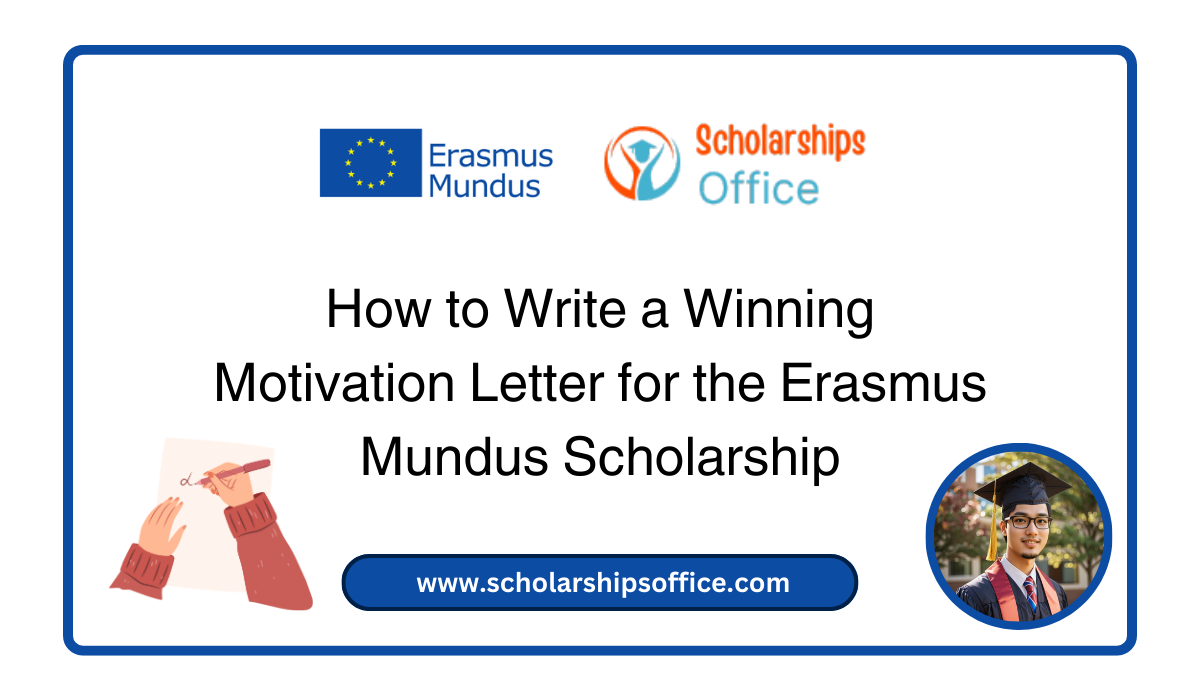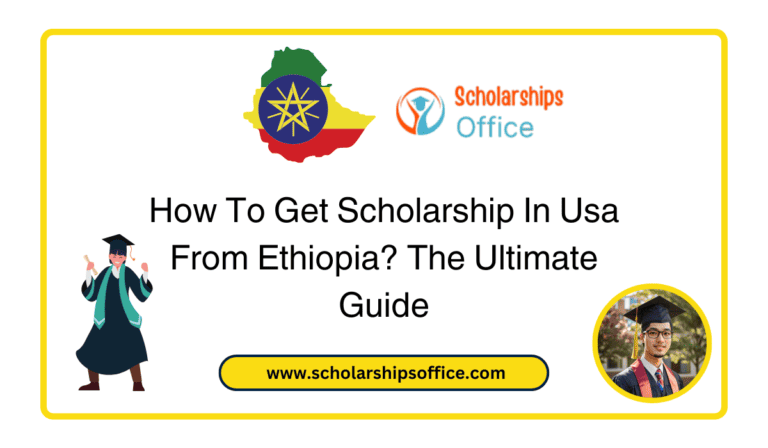How to Write a Winning Motivation Letter for the Erasmus Mundus Scholarship
Got No Time? A Quick Answer for you:
The motivation letter is a crucial part of your Erasmus Mundus scholarship application. It allows you to showcase your accomplishments, competencies, goals and passion. Follow these key tips for writing an outstanding motivation letter:
- Research the program thoroughly to tailor your letter
- Structure your letter covering your past, present and future
- Highlight relevant experiences and skills gained
- Explain why you are an ideal fit for the program
- Convey genuine interest and knowledge of the partner universities
- Describe your career goals and how the program will help achieve them
- Proofread meticulously and have others review to ensure excellent English
- Follow all formatting instructions precisely and keep within word count limits
With careful planning and a compelling, personalized letter, you can maximize your chances of winning this prestigious scholarship.
The Erasmus Mundus scholarship offers a tremendous opportunity to fund your postgraduate studies and gain international experience. However, with limited slots available, the motivation letter is a key factor in determining which applicants are selected.
A well-written motivation letter gives you the chance to showcase your suitability for the program beyond your academic transcripts. It highlights why you are an ideal candidate and how your background, competencies, interests and goals align with what the scholarship is looking for.
In this guide, we will cover how to craft an outstanding motivation letter that secures you the Erasmus Mundus funding. Follow these tips and you will be on your way to an unforgettable adventure gaining a world-class education across Europe!
What is the Erasmus Mundus Scholarship?
Erasmus Mundus is a prestigious European scholarship program for postgraduate students. It fully funds between one to two years of study and includes:
- Tuition fees
- Monthly living allowance
- Insurance coverage
- Travel costs
The program enables studying abroad at multiple European universities that form a consortium. It aims to enhance intercultural understanding through mobility.
There are no restrictions based on nationality or age. Both individuals who have recently finished undergraduate studies and working professionals are eligible. But competition is extremely fierce.
The motivation letter is crucial for standing out from other candidates with stellar academics. It provides the chance to convince the selection committee that you are a deserving recipient of the scholarship.
Why the Motivation Letter Matters
With only limited Erasmus Mundus scholarships available each year, the motivation letter could be what makes or breaks your application. Here are key reasons why it is so important:
💡 Demonstrates your written communication abilities – With an international audience, your English proficiency and articulation skills are on display.
💡 Explains why you are a worthy candidate – The letter complements your academic history by highlighting relevant experiences and knowledge.
💡 Shows your enthusiasm and commitment – Expressing genuine passion and interest is vital for convincing the committee.
💡 Aligns your goals and interests with the program – You can describe how the program is ideal for pursuing your aims.
💡 Lets your personality shine through – It provides an opportunity to share insights beyond grades and test scores.
💡 Tailored to each program – A generic letter is ineffective. Customizing it is crucial.
In short, the letter makes a compelling case for why you deserve the scholarship when simply relying on transcripts is insufficient. It could be the difference between you getting funded or not.
How to Structure and Organize Your Letter
With limited space, having a strategic structure is vital to include all details persuasively. Follow this outline to organize the flow of information:
Opening
- Polite salutation
- Brief background about yourself
Body
- Past – Education, work experience, skills gained
- Present – Motivations, strengths, current activities
- Future – Career goals, how program aligns with aims
Conclusion
- Summary and restatement of interest
- Thank committee and close politely
This format logically takes the reader from your background, to current abilities, leading into future aspirations. Within each section, ensure information links back to showcasing your suitability for the program.
10 Key Details to Include in Your Letter
To create a compelling narrative, here are some specific details and qualities to highlight:
1. Knowledge of the Partner Universities
📍 Research the partner universities within the consortium thoroughly. Referencing specific faculties, departments, professors or facilities demonstrates sincere interest.
2. Program Relevance to Background
📍 Draw clear connections between your academic and professional experiences and the program’s focus. Explain how they have equipped you with relevant knowledge and skills.
3. Unique Contributions
📍 What unique experiences, perspectives or abilities can you bring compared to other candidates? Emphasize key strengths.
4. Career Goals and Aspirations
📍 Articulate your career goals, and how the program will enable you to achieve them. Align your aims with what the partner universities offer.
5. Enthusiasm and Commitment
📍 Convey genuine passion for the subject area and participation in the program. Use examples to support this.
6. Initiative and Leadership
📍 Share instances where you have demonstrated initiative, leadership, perseverance and grit. These qualities predict success.
7. Thesis Topic Idea
📍 Providing a potential thesis topic or area of research shows proactivity. But don’t worry if you are still unsure.
8. Extracurricular Interests
📍 Briefly highlighting non-academic interests makes you more relatable. Clubs, sports, hobbies etc.
9. Financial Need (if applying for funding)
📍 If relevant, explain your need for financial assistance respectfully and tactfully. But focus primarily on your worthiness.
10. Summary and Restatement
📍 Wrap up by reinforcing your motivation and repeating key points. End politely with appreciation for consideration.
Dos and Don’ts
Applying the following tips will further optimize your letter:
DO:
✅ Be specific – Avoid vagueness by providing concrete examples.
✅ Show personality – Use anecdotes selectively to come across as personable.
✅ Be succinct – Every word counts with limited space, so only include essential information.
✅ Proofread extensively – Grammar and spelling errors will immediately disqualify you.
✅ Stay positive – Frame past challenges as learning experiences rather than dwell on them.
✅ Sell yourself – Without sounding arrogant, confidently highlight your impressive qualities.
✅ Say thank you – Expressing appreciation is always wise.
DON’T:
❌ Use clichés – Clichéd language comes across as unoriginal and lacking sincerity.
❌ Exaggerate – Honesty is essential. Embellishing and bragging will backfire.
❌ Copy others – Plagiarism could ruin your chances. Write genuinely using your own voice.
❌ rush – Give yourself ample time to thoughtfully draft multiple versions until satisfied.
Following these principles will help you produce a compelling letter tailored exactly for each program. But there are a few final best practices to incorporate that will elevate your submission.
Expert Tips and Tricks
Vary sentence structure
- Utilize a mix of short, medium and long sentences. This improves flow and readability.
Show, don’t tell
- Back up claims about yourself with real examples rather than just stating them. Provides proof.
Read aloud
- Reading your letter aloud catches errors and awkward phrasing. Our brains often fill in gaps when reading silently.
Use active voice
- Active voice sounds more confident and compelling. For example, “I achieved XYZ” rather than “XYZ was achieved by me”.
Avoid unnecessary repetition
- If a point has been conveyed, don’t repeat it. Find alternative ways to reinforce it.
Be hyperaware of formatting
- Precisely follow all instructions provided regarding font, margins, file type submission etc.
With these insights in mind, you are ready to start crafting an outstanding Erasmus Mundus motivation letter. View it as an opportunity to compellingly make your case rather than just another application requirement.
The effort you put into your letter directly impacts your chances of securing this life-changing scholarship. Follow these tips and set yourself apart from the competition!
Frequently Asked Questions
1. How long should the motivation letter be?
This depends on the specific program’s requirements, but one page or 500-1000 words is typical. Follow their guidelines precisely. Quality over quantity!
2. How should I address the letter?
Use a formal salutation such as “Dear Sir/Madam” or “To the Erasmus Mundus Selection Committee”. Only use named contacts if provided.
3. Can I mention multiple program preferences?
No, tailor each letter specifically for one program. Never indicate interest in other programs.
4. Should I mention my desire to live abroad?
Yes, briefly noting your passion for immersing yourself in other cultures is appropriate.
5. Is it ok to explain financial need?
You can tactfully mention financial need if applying for funding support, but focus primarily on your worthiness.
Conclusion
Gaining the Erasmus Mundus scholarship can be transformative, but requires an outstanding application. While maintaining stellar grades is crucial, the motivation letter often differentiates the successful recipients from the rest.
This guide provided a detailed breakdown of how to craft a compelling letter that will make you stand out. Highlight your aligned interests, relevant background, career goals, and unique qualities. Demonstrate your worthiness while conveying genuine passion.
Keep these tips in mind, and you will maximize your chances of impressing the selection panel and securing this life-changing opportunity. With a carefully crafted motivation letter following the advice outlined, you will be one step closer to embarking on an enriching educational adventure across Europe’s finest universities.




